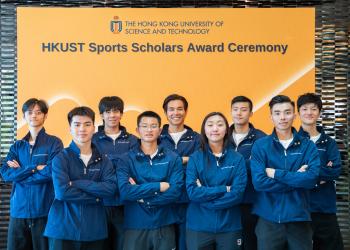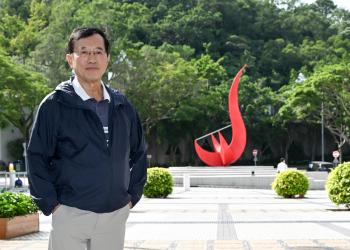HKUST Co-led Study Suggests Future Prosperity in China is Unlikely to be Hindered by Population Aging
A research co-led by social scientists from The Hong Kong University of Science and Technology (HKUST), Shanghai University and International Institute for Applied Systems Analysis (IIASA) has suggested that declining birth rates and aging population in China might not hinder future prosperity as the possible negative consequences could be offset by the increasing education levels in the population.
China has the largest population in the world, with rapid economic growth that could soon rival the USA as the world’s largest economy. According to official sources, China has seen declining birth rates in recent years ̶ the fertility rate in 2020 hit a record low of 1.35 ̶ meaning that for every woman, only an average of 1.35 children are born. As in other countries, the declining birth rates have raised speculations that population decline and aging could threaten the country’s growth and future prosperity. In response, the Central government has introduced a three-child policy and some local governments have begun introducing incentives for larger families.
Recently, a study co-conducted by Prof. Stuart GIETEL-BASTEN, director of the Center for Aging Science based at HKUST, Prof. Guillaume MAROIS, a distinguished professor at the Asian Demographic Research Institute of Shanghai University and a researcher in the Population and Just Societies Program at the IIASA as well as Prof. Wolfgang LUTZ, founding director of the Wittgenstein Centre and IIASA demography expert, has shown that many concerns about aging populations in China and elsewhere in the world, are based on simplistic assumptions about the effects of age structures that are outdated.

Demographers have traditionally used a metric called the age dependency ratio, which relates the number of children and elderly to the size of the working age group 15-64, to calculate the consequences of population aging on economic growth. Children and people past retirement age are considered to be dependent on the working-age population. If the labor force participation rates stay the same, then population aging would lead to a greater proportion of older people who are dependent on the younger working population. This ratio, however, does not consider the fact that labor force participation is changing and not every working person is equally productive.
The researchers have developed a multi-dimensional demographic approach and found that the picture of future economic growth in China is more positive than what the recent news reports have suggested. In particular, this is because with increasing levels of education for women, they are more likely to join the labor force.
Study coauthor Prof. Gietel-Basten said, “We found out that as new cohorts of workers will be much more educated than those who retired, they are likely to be much more productive. This replacement of older lower-educated cohorts by younger ones who are much more educated has the potential to offset many of the negative consequences of population aging.”
“Rather than focusing only on the age and sex structure of the population, our methods took into account the labor force participation and massive expansion of education in China in the assessment of the challenges brought by low fertility and population aging,” explained study lead author Prof. Marois.
The study has also revealed that while the total number of workers will start declining before 2025, those with a high level of education will keep growing, since the younger people entering the labor market are much more educated than older ones retiring.
The researchers said that the implications of their study could provide some reassurance for policymakers, but only if the trend towards increasing education levels continues.
Prof. Lutz said, “Population aging is unavoidable, but negative economic consequences of population aging are not inevitable. More than increasing fertility, ensuring that current and future generations receive a good quality education is the key to deal with challenges of population aging.”
The findings were published in Proceedings of the National Academy of Sciences (PNAS).
About The Hong Kong University of Science and Technology
The Hong Kong University of Science and Technology (HKUST) (https://hkust.edu.hk/) is a world-class research intensive university that focuses on science, technology and business as well as humanities and social science. HKUST offers an international campus, and a holistic and interdisciplinary pedagogy to nurture well-rounded graduates with global vision, a strong entrepreneurial spirit and innovative thinking. Over 80% of our research work were rated “Internationally excellent” or “world leading” in the Research Assessment Exercise 2020 of Hong Kong’s University Grants Committee. We were ranked 3rd in Times Higher Education’s Young University Rankings 2021, and our graduates were ranked 26th worldwide and among the best from universities from Asia in Global University Employability Survey 2020.
About The Asian Demographic Research Institute
Asian Demographic Research Institute (ADRI) at Shanghai University focuses on multiscale comparative analysis of Asian population dynamics and its socioeconomic and environmental implications across Asian countries and subregions. It was first established in 2015. Building on the methods of multi-dimensional demography, ADRI studies population dynamics by age, gender, education, household status, health condition, rural/urban residence, and spatial distributions. https://adri.shu.edu.cn
About The International Institute for Applied Systems Analysis
The International Institute for Applied Systems Analysis (IIASA) is an international scientific institute that conducts research into the critical issues of global environmental, economic, technological, and social change that we face in the twenty-first century. Our findings provide valuable options to policymakers to shape the future of our changing world. IIASA is independent and funded by prestigious research funding agencies in Africa, the Americas, Asia, and Europe. www.iiasa.ac.at
For media enquiries, please contact:
HKUST
Anita LAM
Tel: +852 2358 6313
Email: anitalam@ust.hk
Lindy WONG
Tel: +852 2358 6306 / 5190 7882
Email: lindywong@ust.hk
ADRI
Maxine MIN
Tel: 00 86 21 6613 2809
Email: minyue_maxine@shu.edu.cn
IIASA
Ansa HEYL
Tel: +43 2236 807 574
Mob: +43 676 83 807 574
Email: heyl@iiasa.ac.at
About The Hong Kong University of Science and Technology
The Hong Kong University of Science and Technology (HKUST) (https://hkust.edu.hk/) is a world-class research intensive university that focuses on science, technology and business as well as humanities and social science. HKUST offers an international campus, and a holistic and interdisciplinary pedagogy to nurture well-rounded graduates with global vision, a strong entrepreneurial spirit and innovative thinking. Over 80% of our research work were rated “Internationally excellent” or “world leading” in the Research Assessment Exercise 2020 of Hong Kong’s University Grants Committee. We were ranked 3rd in Times Higher Education’s Young University Rankings 2021, and our graduates were ranked 26th worldwide and among the best from universities from Asia in Global University Employability Survey 2020.
About The Asian Demographic Research Institute
Asian Demographic Research Institute (ADRI) at Shanghai University focuses on multiscale comparative analysis of Asian population dynamics and its socioeconomic and environmental implications across Asian countries and subregions. It was first established in 2015. Building on the methods of multi-dimensional demography, ADRI studies population dynamics by age, gender, education, household status, health condition, rural/urban residence, and spatial distributions. https://adri.shu.edu.cn
About The International Institute for Applied Systems Analysis
The International Institute for Applied Systems Analysis (IIASA) is an international scientific institute that conducts research into the critical issues of global environmental, economic, technological, and social change that we face in the twenty-first century. Our findings provide valuable options to policymakers to shape the future of our changing world. IIASA is independent and funded by prestigious research funding agencies in Africa, the Americas, Asia, and Europe. www.iiasa.ac.at









